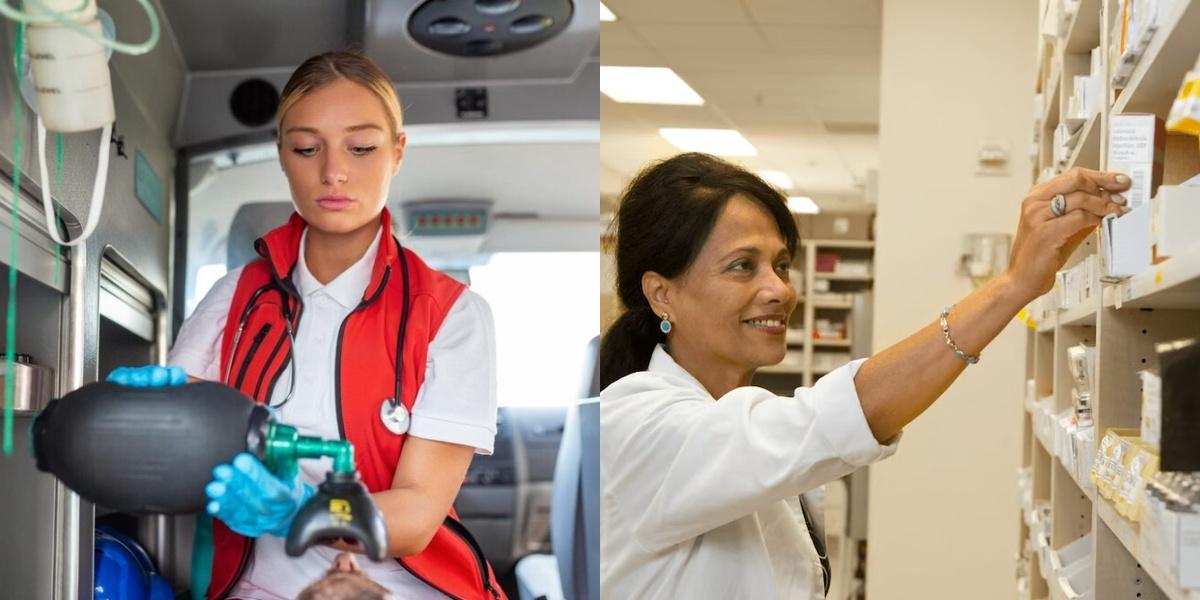Emergency Medical Technician vs Pharmacy Technician

Key Points:
- EMTs provide emergency medical care, while Pharmacy Technicians assist pharmacists in filling prescriptions and managing pharmacy operations.
- EMTs typically earn a higher median salary than Pharmacy Technicians.
- Both careers have good job prospects.
- EMTs require in-person training and certification, while Pharmacy Technicians can often complete their training online or in-person.
- EMT training is generally more intensive and costly than Pharmacy Technician training, which can be completed in a shorter timeframe.
When it comes to choosing a career in the healthcare field, there are a plethora of options to consider. Two popular choices are becoming an emergency medical technician (EMT) or a pharmacy technician. While both careers involve helping others, there are distinct differences between the two. In this blog post, we will explore the roles of EMTs and pharmacy technicians, compare their job descriptions, education and training requirements, and discuss the career outlook and salary potential for each profession.
Emergency Medical Technician vs Pharmacy Technician: Education and Training
To become an EMT or a pharmacy technician, specific education and training are required. Here is an overview of the requirements for each profession:
Emergency Medical Technician (EMT)
- Complete a state-approved EMT training program
- Obtain CPR certification
- Pass the National Registry of Emergency Medical Technicians (NREMT) exam
- Obtain state licensure or certification, which may vary depending on the level of EMT training
Pharmacy Technician
- Complete a pharmacy technician training program or receive on-the-job training
- Some states require pharmacy technicians to be certified, which involves passing an exam
- Continuing education may be necessary to maintain certification or keep up with changes in the field
Emergency Medical Technician vs Pharmacy Technician: Career Outlook and Salary
The career outlook and salary potential for EMTs and pharmacy technicians can vary. Here is an overview of the job prospects and earnings for each profession:
Emergency Medical Technician (EMT)
- Job Outlook: According to the Bureau of Labor Statistics (BLS), employment of EMTs is projected to grow 6 percent from 2019 to 2029, faster than the average for all occupations. The demand for EMTs is expected to increase due to the aging population and the need for emergency medical services.
- Median Annual Salary: The median annual wage for EMTs was $35,400 in May 2020, according to the BLS. The salary can vary depending on the level of EMT training and the geographic location.
Pharmacy Technician
- Job Outlook: The BLS projects that employment of pharmacy technicians will grow 4 percent from 2019 to 2029, which is about as fast as the average for all occupations. The demand for pharmacy technicians is expected to increase as the population ages and requires more prescription medications.
- Median Annual Salary: According to the BLS, the median annual wage for pharmacy technicians was $34,020 in May 2020. The salary can vary depending on factors such as experience, certification, and the type of healthcare setting.
Final Thoughts
Choosing between a career as an emergency medical technician or a pharmacy technician ultimately depends on your interests, skills, and career goals. If you thrive in high-pressure, fast-paced environments and enjoy providing immediate medical care in emergency situations, becoming an EMT may be the right path for you. On the other hand, if you prefer working in a pharmacy setting, assisting pharmacists in dispensing medications, and ensuring patient safety, pursuing a career as a pharmacy technician may be a better fit. Both professions offer rewarding opportunities to make a positive impact on the lives of others and contribute to the healthcare field.
Discover Dreambound's programs, conveniently offered in various locations. Find out more about these two vocations by visiting:

Alyssa Jane is part of the customer success team at Dreambound. She works with students, training providers, and employers, helping them have a smooth customer journey. She is also an ESL tutor and Licensed Psychometrician. She is fond of traveling, photography, and discovering new restaurants.





